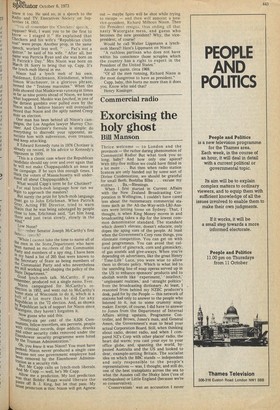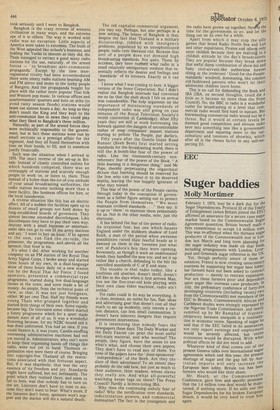Commercial radio
Exorcising the holy ghost
Bill Manson
Thrice welcome — to London and the provinces — the rather daring phenomenon of Commercial Radio! But what took you so long; baby? And how only one apiece? With tifty-five million we could have fitted in a lot more . . . But then when radio station licences are only handed out by some sort of Divine Condensation, we should be grateful for small Beeb, Beeblba BIba . . . excuse my stutter, . . . Ba,—Blessings. When I first started in Current Affairs with the New Zealand Broadcasting Corporation in Wellington, I couldn't have cared less about the razzamatazz commercial stations such as the All-the-Way-with-LBJ-Aussies were letting loose on Sydney. That, I thought, is when King Money moves in and broadcasting takes a dip for the lowest common denominator standard. The standard which doesn't elevate, doesn't educate, only dopes the aping ears of the people. At least when the Government's Corp runs things, you eliminate competition. You can get on with good programmes. You can avoid that cultural desert of gimcrack, corn and gimmickry, of gas sounds and give-aways. When you're depending on advertisers, like the great Henry 'Time-Life' Luce, you were wise to allow them to dictate policy. Which is what led to the unending line of soap operas served up in the US to enhance sponsors' products and to abolish words like 'experiment,' intellect,' 'unpleasant realities,' and 'straight politics' from the broadcasting dictionary. At least, I reasoned from behind my NZBC producer's desk, paid for by the People — this network of stations had only to answer to the people who listened to it, not to some crummy soapmaker. Except, of course, I did have to answer to Jones from the Department of Internal Affairs sitting upstairs, Programme Controller, and Brown, Jones's man, and General • Amen, the Government's man to head your actual Corporation Board. Still, when thinking about radio, decent radio, and when I compared NZ's Corp with other places' radio, the heart did warm; you cast your eye to your office globe, and, spanning the world, bypassed Australia and the US and looked to dear, example-setting Britain. The socialist idea on which the BBC stands — independent and only responsible to the people's representatives — was, I thought, and still do, one of the best transplants across the sea to what the Aussies call the Shaky Isles ('cos of earthquakes) or Little England (because we're so conservative).
'Conservatism' was an accusation I never took seriously until I went to Bangkok.
Bangkok is the crazy reverse of western civilisation in many ways, and the extreme ape of it in others. The way it worked with radio was no exception. Little aspects of America were taken to extremes. The froth of the West appealed like nobody's business, and holding the Yanks to ransom as they did, the Thais managed to extract a good many radio stations for the use, naturally, of the armed forces — ' to broadcast anti-communist propaganda.' Except by the time interregimental rivalry had been accommodated 'there were ninety radio stations beaming AM and FM stereo and mono to the lucky people of Bangers. And the propaganda fought for place with the rather more popular Thai folk and Western pop music. In various offices and quartermasters' quarters and huts on stilts (to avoid rainy season floods) stations would beam out sixteen hours a day. As long as they didn't insult the King and they kept to the anti-communist line in news they could play what they liked to Bangkok's three million.
Naturally, as part of the armed forces they were technically responsible to the govern ment, but in fact these stations were run by small sections as a prestige affair for the regiment. And they all found themselves with time on their hands, to fill, and to somehow justify financially.
Such was the situation when I arrived in 1970. The exact reverse of the set-up in Bri tain. Instead of closely controlled outlets for which hundreds competed, there was an oversupply of stations and scarcely enough people to work on, or listen to, them. Thus instead of a holier-than-the-lot-of-you attitude of your usual broadcasting authorities, the radio station became nothing more than a mere facility, like business offices for hire, or the local launderette.
A reverse situation like this has an electric effect. All of a sudden the facilities open up to dozens of small groups not held down by long-established boards of governors. They almost become extended discotheques. Like discotheques they have to pay their own way.
Anyone with a small bviness , or entertainment idea can go to one ,of ,the,army stations and say, 'I want to buy an hour,' If he agrees to the sum, can find the records, the presenter, the programme, and above all the sponsor, that hour is his.
It's what I did. After working for another company on an FM station of the Royal Thai Army Signal Corps, I broke away and started three hours of my own, in a dual-language show of three hours daily on a new station run by the Royal Thai Air Force. I found sponsors, presented a commercial-type programme, started doing live dual-language shows in the town, and soon made a bit of money. As simple, from the technical point of view, as that. It was not just foreigners, either. 90 per cent Thai. Half my friends were young Thais who grouped together and started little things of their own. Some rapidly became big. On television some others started a funny programme which for a spurt made instant stars of all of us. It was a wonderful flowering because, for my NZBC-bound self it was done unfettered. You had an idea. If you could finance it, it was yours. Candle-snuffing overseeing administrative machines had not yet moved in. Administrators, who can't seem to keep their organising hands off things like radio, were not yet to hand. Thomson organisation men were there of course. Bringing into copyright-free Thailand all the restric tions associated with that fortuous aspect. But, if it was shambolic, that was the very essence of its freedom and joy. Standards might have suffered, but not necessarily. The point which they realised there, and seem to fail to here, was that nobody has to turn on the set. Listeners don't have to tune to stations they don't want to hear. What's more, if the listeners don't listen, sponsors won't support and the station will die a natural death. The old capitalist-commercial argument, you may say. Perhaps, but also perhaps in a new setting. The lesson of Bangkok is that, despite the fact that Thailand is a military dictatorship, riddled with insurgency problems, populated by an unsophisticated people, radio runs liberated riot. Because that sort of a people does not demand high broadcasting standards. Not quite. There, by accident, they have realised what radio is: a small relatively unimportant medium that essentially reflects the desires and feelings and ' standards' of its listeners. Exactly as it can here.
I knew what I was coming to here. A bigger version of the home Corporation. But I didn't realise the Bangkok interlude had converted me so far that the shell shock I felt on arrival was considerable. The holy argument on the importance of maintaining standards of independent radio was still going on (see minutes of the Royal Television Society's recent convention at Cambridge). After fifty years they are still at work buttressing the bulwark against the dangers of uncontrollable rashes of soap companies' puppet stations starting to pollute The People, pur darlin's. Fifty years after the Gentle Giant Road Runner (Beeb Beeb) first started setting standards for the broadcasting world, there is still the A-bomb-like fear of the power of radio. Like the nineteenth-century nonreformers' fear of the power of the Book. "A little learning is a dangerous thing," said Mr Pope, thereby perpetuating the oligarchical dictum that learning should be reserved for the few who can pursue it to its deserved depths, leaving the rest happily ignorant of what they missed.
This fear of the power of the People carries through today in the conception of government as a father figure setting out to protect the People from themselves. " We must maintain civilised standards . . ." they say. It is up to ' them ' to maintain them presumably for us. Not in the other media, note, just the electronic.
It lies behind the fear of the power of radio. An irrational fear, but one which haunts England under the stubborn shadow of Lord Reith, a man of the period when awesome possibilities raised their fearful heads as it dawned on them in the 'twenties just what sort of Pandora's box they were opening. Reverently, as though it were an undetonated bomb, they handled the new toy, and set it up rather like a church, defending to the hilt the sanctified standards of C of E and state.
The trouble is that radio today, like a toothless old alsatian, doesn't thrill, doesn't kill like in the days when it first arrived. Man, you see the five-year-old kids playing with their own class video machine, radio ain't nothinY Yet radio could in its way be everything. It is close, intimate, an outlet for fun, flair, ideas and advertising gear that doesn't cost all that much to set up modestly, only travels a certain distance, can link small communities. It doesn't have inherent dangers that require government intervention.
It is interesting that nobody fears the newspapers these days. The Daily Worker and the Daily Fascist can print the most awful anti-state material, and who worries? The people, they figure, have the sense to see what's what, and choose their own papers. They don't have to read any of them. Yet none of the papers have the ' state-sponsored ' ' independence ' of the Beeb. Are they the slave of their advertisers? To an extent they probably do the odd bow, but just as much to their audience, their readers, whose slaves they really are. And what all-powerful watchdog keeps tags on them? The Press Council? Hardly a licence-toting IBA.
Why then the continuing unholy fear of radio? Why the terrification over standards, indoctrination powers, and commercial domination? The fact is the youngsters and the radio have grown up together. Node the time for the. government to eo. and let the thing out on its own for a while.
Apart from which it may stop the silly games that breed Radio North Sea and LUX and other expatriates. Pirates and otherA only seem childish because they are reacting to a childish attitude by the day's broadcasters. They are popular because they break clowa, that awful damp combination of show-biz and fusty civil-servant-like authorities forever tilting at the irrelevant Good-for-the-Peopiestandards ' windmill, dominating, like tolerant, old-fashioned parents who won't let their adolescent children leave home. This is no call for disbanding the Beeb and IBA (IBA, on second thoughts, could die a little so it became no more than the Press Council). No, the BBC in radio is a wonderful outlet for broadcasting at a level that coinmercial radio would find hard to sustain. But freewheeling commercial radio would not be a threat. But it would at certain levels be damned good competition and elevate radio here into something less like a government department and equating more to the razzamatazz and tensions of showbiz, which after all is the rhesus factor in any self-respecting DJ.



































 Previous page
Previous page